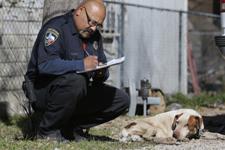Report Writing for Human Beings
Reports are an important part of the work day for every animal officer. Dozens of reports will be written weekly, some very short, such as reporting a cat in a trap, others excruciatingly long when preparing a probable cause statement or reports for the court. With so much writing involved in an officer's day it is surprising that poor report writing and penmanship is one of the most common complaints from supervisors.
Poor reporting destroys court cases, can reverse enforcement actions and leave people and animals in unsafe conditions. Notices issued that are not legible or clearly understood can reverse compliance and just wastes everyone’s time.
Most reports will be filed away, perhaps not viewed for years but don’t make the mistake of thinking it can’t or won’t be later pulled out, dusted off and used in court. A sloppy report can come back to bite you.
After the incident is cleared or it is not being used in a criminal investigation your report becomes a public record. At that time, anyone and everyone can read your report and the general citizenry, the news media, almost anyone can request a copy of your report.
There may be some information found on your reports that will not be considered public record. Those exceptions and further discussion regarding public records are found in Section 8.
Report writing is not difficult or complex; good habits built now will serve you very well throughout your career.
Follow these 4 simple guidelines for good reports.
A good report is always:
Simple, right?
Reports are an important part of the work day for every animal officer. Dozens of reports will be written weekly, some very short, such as reporting a cat in a trap, others excruciatingly long when preparing a probable cause statement or reports for the court. With so much writing involved in an officer's day it is surprising that poor report writing and penmanship is one of the most common complaints from supervisors.
Poor reporting destroys court cases, can reverse enforcement actions and leave people and animals in unsafe conditions. Notices issued that are not legible or clearly understood can reverse compliance and just wastes everyone’s time.
Most reports will be filed away, perhaps not viewed for years but don’t make the mistake of thinking it can’t or won’t be later pulled out, dusted off and used in court. A sloppy report can come back to bite you.
After the incident is cleared or it is not being used in a criminal investigation your report becomes a public record. At that time, anyone and everyone can read your report and the general citizenry, the news media, almost anyone can request a copy of your report.
There may be some information found on your reports that will not be considered public record. Those exceptions and further discussion regarding public records are found in Section 8.
Report writing is not difficult or complex; good habits built now will serve you very well throughout your career.
Follow these 4 simple guidelines for good reports.
A good report is always:
- Complete
- Clear
- Concise
- Accurate
Simple, right?
Good reports start with good notes.
Field notes made on the scene are the primary source of information for your report which may not be written for several days. Record your initial observations, contacts, and the basic information you will need for your report. Those observations will be lost shortly after you leave the scene and to produce a good report you will need good notes.
Field Notes
Few of us have eidetic or photographic memories and your field notes are crucial to recall.
Field Notes:
those involved more than necessary; people do not appreciate it and you will appear as if you didn’t do your job
properly.
Details and questions regarding an incident can be lost in a very short period of time. Even if you rely on the review of your body cam footage (if you are assigned one) for every incident, field notes are more reliable than what you will remember.
Field Notes
Few of us have eidetic or photographic memories and your field notes are crucial to recall.
Field Notes:
- Reduces the need to re-contact people.
those involved more than necessary; people do not appreciate it and you will appear as if you didn’t do your job
properly.
- Will help you recall details of an incident.
- May be used to defend statements and/or your reports in court.
Details and questions regarding an incident can be lost in a very short period of time. Even if you rely on the review of your body cam footage (if you are assigned one) for every incident, field notes are more reliable than what you will remember.
Field Notebooks
The field notebook should:
your chronology.
The field notebook should:
- Be large for easy writing and small enough for easy pocket carry.
- Have sequentially numbered pages.
your chronology.
- Protected by a sufficient cover.

Taking Good Notes
Record the 5 W’s
Notes should include:
to the animal such as bob tail, lame left front leg, white chest blaze...
broken fencing at the edge of the property, etc.
It helps to take pictures of the locations, animals and persons you come into contact with.
More complex incidents may require a single notebook for that case alone. Using numbered notebooks for a single or multiple incidents keeps information in chronological order.
Keep personal notes out of your field notebook. Personal notes such as meetings, lists and irrelevant contacts will influence and confuse you and any readers.
There are varying opinions regarding retaining field notes or destroying them when the incident is resolved. Inquire as to your agency’s policy.
- Your notes should be written while you are at the scene.
- The use of abbreviations is common for note taking but using common language is preferable. If using your own abbreviations, remain consistent.
Record the 5 W’s
- Who
- What
- When
- Why
- Where
- How
Notes should include:
- Date
- Times
- Environmental Conditions
- People you spoke with, statements
- Contacts
- Addresses
- Animal type, Description
to the animal such as bob tail, lame left front leg, white chest blaze...
- Details
broken fencing at the edge of the property, etc.
It helps to take pictures of the locations, animals and persons you come into contact with.
- Your own questions.
More complex incidents may require a single notebook for that case alone. Using numbered notebooks for a single or multiple incidents keeps information in chronological order.
Keep personal notes out of your field notebook. Personal notes such as meetings, lists and irrelevant contacts will influence and confuse you and any readers.
There are varying opinions regarding retaining field notes or destroying them when the incident is resolved. Inquire as to your agency’s policy.
Writing Reports
Reports must always be:
Always write your report in an objective manner recording the facts as you experienced them.
"The dog approached me with it's ears laid back and growling."
not
"The dog approached me looking mean."
"The man staggered away from my vehicle."
not
"The man walked away from my vehicle acting drunk."
Always write in the first person.
Most reports are formatted to agency needs. Most will contain areas to record the following:
- Complete
- Clear
- Concise
- Accurate
Always write your report in an objective manner recording the facts as you experienced them.
"The dog approached me with it's ears laid back and growling."
not
"The dog approached me looking mean."
"The man staggered away from my vehicle."
not
"The man walked away from my vehicle acting drunk."
Always write in the first person.
Most reports are formatted to agency needs. Most will contain areas to record the following:
- Who the officer(s) and complainant(s) are
- What the incident was
- When (time and date) the officer received the call
- Where the incident occurred
Keep it Simple and Brief
Brevity saves time, avoids confusion and someone misunderstanding. Get to the point without adding unnecessary information.
Use one idea per sentence.
Avoid a report that is wordy. Wordy reports appear to try too hard to be important without lending any new
information.
Improper Proper
The month of June 10, 2018 June, 2018
Answered in the affirmative Said Yes
Joe nodded in agreement
Use quotations only if a exact quote Joe said “Yep.”
Brevity saves time, avoids confusion and someone misunderstanding. Get to the point without adding unnecessary information.
Use one idea per sentence.
Avoid a report that is wordy. Wordy reports appear to try too hard to be important without lending any new
information.
Improper Proper
The month of June 10, 2018 June, 2018
Answered in the affirmative Said Yes
Joe nodded in agreement
Use quotations only if a exact quote Joe said “Yep.”

Avoid Jargon
Simply put, jargon is any word or phrase that loses or changes meaning when you use it with people who aren't in your field. Jargon can also be part of the culture of a single agency. Avoid jargon in your reports.
If the word isn’t in the dictionary, there’s a good chance it’s jargon, and you should ditch it.
Here are a few terms you may be familiar with that you can simplify:
Alpha – dominate
Anomoly – unusual
Estrus – in heat
Gestation – pregnant or pregnancy
Non-ambulatory – lame, can not walk
Stick – Control pole
Zoonotic – infectious to humans
While these are appropriate terms they are not well understood by someone who is not familiar with medicine or animals.
Jargon Out of Control Just for fun.
Avoid Abbreviations
“PU” means “pick-up” to an animal officer, but a civilian may think of something smelly. For the most part, there is no need to abbreviate anything. It only takes a few keystrokes to spell out the word entirely and eliminate any confusion. It is worth the extra few seconds.
Report in Chronological Order
Write your report in the order of time the events or observations occurred. Get used to this, most report summaries will be requested in chronological order.
Improper
01/14/18
“...I arrived at 123 Stark Drive at 0900 and radio’d in my presence. Later, I observed 3 black cats in the middle of Stark Drive matching the description...”
Proper
01/14/18
“...I arrived at 123 Stark Drive at 0900 and radio’d in my presence. At 0905, I observed 3 black cats in the middle of Stark Drive matching the description...”
Write your report in the order of time the events or observations occurred. Get used to this, most report summaries will be requested in chronological order.
Improper
01/14/18
“...I arrived at 123 Stark Drive at 0900 and radio’d in my presence. Later, I observed 3 black cats in the middle of Stark Drive matching the description...”
Proper
01/14/18
“...I arrived at 123 Stark Drive at 0900 and radio’d in my presence. At 0905, I observed 3 black cats in the middle of Stark Drive matching the description...”
Use Past Tense
By the time you write your report, everything before has already happened. People move, animals change ownership.
Improper
“The dog and it’s owner lives at 267 Blount Drive...”
Proper
“The dog and it’s owner lived at 267 Blount Drive”
By the time you write your report, everything before has already happened. People move, animals change ownership.
Improper
“The dog and it’s owner lives at 267 Blount Drive...”
Proper
“The dog and it’s owner lived at 267 Blount Drive”
Use Active Voice
Describe the subject performing the action.
Use active voice whenever possible.
Improper
When asked
She shut the gate
It ran
The dog to went the animal shelter and was admitted.
Who did what?? It reads as if the dog drove the truck.
Proper
I asked
Ms. Brown shut the gate
The dog chased
I transported the dog to the animal shelter and Dan Owen began the animal’s admission.
Describe the subject performing the action.
Use active voice whenever possible.
Improper
When asked
She shut the gate
It ran
The dog to went the animal shelter and was admitted.
Who did what?? It reads as if the dog drove the truck.
Proper
I asked
Ms. Brown shut the gate
The dog chased
I transported the dog to the animal shelter and Dan Owen began the animal’s admission.
Use Correct Spelling
A great way to destroy credibility is to appear uneducated, careless or unprofessional in report writing.
Lack of spelling skills is one of the most common complaints regarding reports and the easiest to correct. Here are a few commonly used words that are frequently misspelled in animal officer reports:
feral
abandoned
nuisance
occasionally
euthanasia
sheriff
chihuahua
separate
all right
a lot
receive
they’re
their
there
its’
it’s
and the list goes on....
Most reports are written using computers with spell and grammar check. If you use a program that doesn’t have those features, use one that does, like Microsoft Word. Create your report, check your work, then cut and paste into your report program.
If you must hand write your report, print legibly, don’t use cursive. Check your work, the results are well worth it.
Use Correct Punctuation
Proper punctuation can make or break a good report.
There are fourteen punctuation marks commonly used in English grammar.
They are the:
Here is a handy, brief primer with examples for punctuation use.
Proper punctuation can make or break a good report.
There are fourteen punctuation marks commonly used in English grammar.
They are the:
- period
- question mark
- exclamation point
- comma
- semicolon
- colon
- dash
- hyphen
- parentheses
- brackets
- braces
- apostrophe
- quotation marks
- ellipsis
Here is a handy, brief primer with examples for punctuation use.
| basic_punctuation_rules.pdf | |
| File Size: | 159 kb |
| File Type: | |
North - South Carolina Laws - Animal Control - Animal Protection
PO Box 3341 Eden, NC 27289



